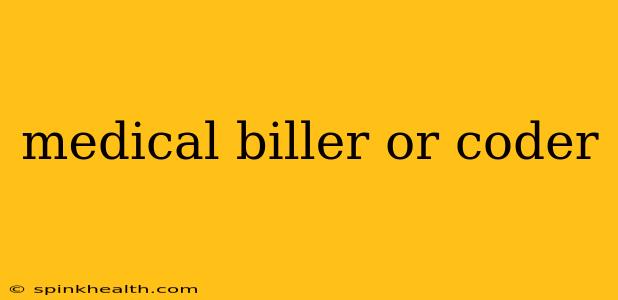The Exciting World of Medical Billing and Coding: More Than Just Numbers
The world of healthcare is complex, a vast network of procedures, diagnoses, and insurance regulations. Behind the scenes, ensuring that medical professionals get paid for their services and that patients receive accurate billing, are the unsung heroes: medical billers and coders. But what's the difference? Are these two roles interchangeable, or are they distinct career paths? Let's dive in and explore this fascinating field.
My name is Sarah, and I've been a medical coder for over 10 years. I've seen firsthand how crucial these roles are to the smooth functioning of any healthcare facility, from small clinics to large hospitals. This isn't just about numbers; it's about ensuring patients receive the care they need and providers are fairly compensated for their expertise.
What Does a Medical Coder Do?
Imagine yourself as a translator, but instead of languages, you're translating medical diagnoses and procedures into numerical codes. That's the essence of medical coding. Coders use standardized coding systems, primarily the International Classification of Diseases (ICD) codes for diagnoses and Current Procedural Terminology (CPT) codes for procedures, to accurately reflect the services provided to patients. This meticulous process is crucial for insurance claims processing. A single incorrect code can lead to claim denials, delayed payments, and even financial losses for the healthcare provider.
My day often involves reviewing patient charts, identifying the correct codes based on the physician's notes, and ensuring the codes accurately reflect the services rendered. It’s detail-oriented work requiring a deep understanding of medical terminology and anatomy, as well as familiarity with the various coding systems and their updates. The accuracy of my work directly impacts the financial health of the clinic where I work.
What Does a Medical Biller Do?
While coders translate medical information into codes, billers use those codes to create and submit claims to insurance companies. They are the financial architects of the healthcare system, navigating the intricate world of insurance policies, billing procedures, and payment processing.
Think of it this way: the coder prepares the blueprint, and the biller constructs the building. They handle the submission of claims, follow up on denials, process payments, and manage patient accounts. This requires strong organizational skills, attention to detail, and a thorough understanding of insurance regulations and billing practices. They also handle patient inquiries regarding their bills and payment options.
Medical Biller vs. Medical Coder: What Are the Key Differences?
The key difference lies in their primary functions: coders translate medical information into codes, while billers use those codes to manage the financial aspects of patient care. While some professionals may handle both coding and billing, they are distinct skill sets. One can be highly skilled in coding, but lack the experience or knowledge of billing practices, and vice versa.
What are the educational requirements for a medical biller or coder?
Many medical billers and coders gain entry-level positions after completing a formal training program, either an associate's degree or a certificate program. Certification is often beneficial, demonstrating a commitment to professional development and proficiency in the field. Ongoing professional development is also essential to stay updated on the latest coding and billing regulations and guidelines.
What is the job outlook for medical billers and coders?
The job outlook for medical billers and coders is generally positive, due to the ever-increasing complexity of the healthcare system and the rising demand for accurate and efficient billing and coding practices. The field is expected to continue growing steadily in the coming years.
What skills are needed to be a successful medical biller or coder?
Success in these roles requires a unique blend of skills. Analytical skills, attention to detail, and strong organizational skills are crucial. Proficiency in medical terminology is essential for coders, while billers need a deep understanding of insurance regulations and billing practices. Both roles require strong communication and interpersonal skills to interact with physicians, patients, and insurance companies.
This isn't just a job; it's a vital part of the healthcare ecosystem. If you're detail-oriented, enjoy working with numbers, and have a passion for healthcare, a career in medical billing or coding could be the perfect fit. It’s a challenging but rewarding field where you can make a real difference in the lives of both patients and healthcare providers.

